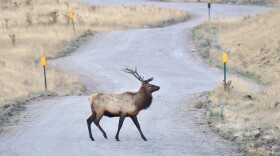As we head into the holiday season, the state and several food banks have partnered to relaunch a program that makes it easy to donate large wild game meat to feed the needy.
Administered by the Roadrunner Food Bank, New Mexico Hunters Helping the Hungry allows hunters to donate their freshly killed wild game.
Here’s how it works.
Only big game will be accepted – including deer, elk, antelope, ibex, oryx and barbary sheep.
Once an animal is legally killed and tagged, hunters will need to properly field dress the animal within one hour of harvesting and quickly refrigerate or chill the meat below 41 degrees.
Additionally, hunters need to comply with food safety regulations when transporting the meat to a processing facility by keeping it consistently chilled, shielded from contamination and separated from other food items.
Donors will need to fill out a form confirming the meat was properly cared for.
For now, there are two approved food processors enrolled in the program:
- Honest Processing, 945 S. 2nd St. in Raton. (575) 779-6612
- Padilla’s Meat Cutting and Processing, 72 Hondo Seco Rd. in Arroyo Hondo. (575) 776-1233
Other processors can apply to take part in the program as well.
All of the processing costs are already covered by donors, so all hunters have to do is simply drop off the meat at one of these butcher shops. However, hunters can elect to cover the costs if they’d like to.
Though, it is crucial that the animal appears to be healthy and free of illnesses. If the animal is deemed unsafe for human consumption, processors will turn away the meat.
Some visual signs of an unhealthy animal can include sunken eyes, appearing unusually thin or weak, scabby skin, tick infestations, or discharges of dark blood or creamy/green substances. A bad smell can also be a sign of decaying flesh.
Once accepted, the meat will be ground, packaged, and eventually collected by Roadrunner Food Bank or the Food Depot and distributed to their partners to feed New Mexicans across the state.
Additional information about the program can be found here.





